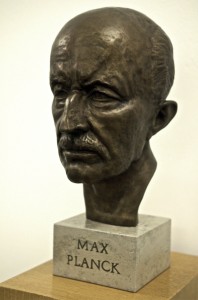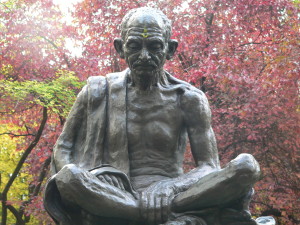Posted by Roberta Grimes • December 23, 2014 • 0 Comment
Afterlife Research, Quantum Physics, Understanding Reality
An amazing debate continues to rage in the scientific community. Do we, or do we not, have free will? Experiments indicate that our brains become active  and we start the process of moving our bodies before we make the decision to move, which troubling fact has led many researchers to conclude that our apparent free will is an illusion. To quote a recent article in Scientific American:
and we start the process of moving our bodies before we make the decision to move, which troubling fact has led many researchers to conclude that our apparent free will is an illusion. To quote a recent article in Scientific American:
“Our decisions are predetermined unconsciously a long time before our consciousness kicks in,” [John-Dylan] Haynes [of the Bernstein Center for Computational Neuroscience in Berlin] commented to New Scientist, while adding that “it seems that the brain is making the decision before the person.” Others share his opinion. Evolutionary biologist Jerry Coyne has written: “So it is with all of our … choices: not one of them results from a free and conscious decision on our part. There is no freedom of choice, no free will.” Neuroscientist Sam Harris has concluded from these findings that we are “biochemical puppets”: “If we were to detect [people’s] conscious choices on a brain scanner seconds before they were aware of them … this would directly challenge their status as conscious agents in control of their inner lives.”
In 2010 I wrote about this problem in The Fun of Dying, where I showed how what afterlife researchers are learning readily explains these results. But mainstream scientific researchers still have little understanding of the nature of our minds, so they continue to do these experiments. And they continue to find their results troubling. The author of the article cited above essentially says what you or I would say: But I really do deliberate! I think things through! I make rational decisions. So of course I have free will:
Every one of us takes actions every day that we have consciously planned for ourselves. It is possible that the neural activity that carries out this planning has no effect on what we do or that it just concocts stories after the fact to explain to ourselves and others what we did. But that would make little evolutionary sense. The brain makes up only 2 percent of the human body’s weight but consumes 20 percent of its energy. There would be strong evolutionary pressure against neural processes that enable intricate conscious thought yet are irrelevant to our behavior. The brain circuits responsible for my imagining that this is the best way to write this essay are likely causing it to turn out this way.
This author is fond of catchy terms, so he refers to those researchers who believe we have no free will as “willusionists,” and he makes the mainstream scientist’s stubborn mistake of dismissing the notion that human consciousness might exist apart from the brain:
Willusionists, however, suggest this internalized brain processing simply cannot count as free will. They often say that people who believe in free will must be “dualists” who are convinced that the mind somehow exists as a nonphysical entity, separate from the brain. “Free will is the idea that we make choices and have thoughts independent of anything remotely resembling a physical process,” wrote neuroscientist Read Montague in 2008.
This problem of experimental results that seem to suggest that we have no free will is one of many conundrums that mainstream scientists face because they continue to insist against compelling evidence that “material” reality must be material, and that the human mind must be generated by the brain. Neither assumption is correct. And the scientific evidence that neither assumption is correct is so abundant now that for scientists to stubbornly hold to these dogmas has gone beyond nonsensical to become ridiculous. Mainstream science has transformed itself from a system of open-minded inquiry into just another belief-system. And the last thing this world needs right now is yet one more closed-minded religion!
Max Planck received the 1918 Nobel Prize in Physics as the father of quantum mechanics. He should have received a second Nobel Prize for his greater insight that human consciousness is primary and pre-existing. In 1931 he said:
“I regard consciousness as fundamental. I regard matter as derivative from consciousness. We cannot get behind consciousness. Everything that we talk about, everything that we regard as existing, postulates consciousness.”
Planck’s insight was derived from his quantum physics research. Afterlife researchers have come from a different direction and reached precisely the same conclusion. Each human mind is part of the same core Mind that continuously brings forth the universe. I use Planck’s term, “Mind,” because  the real creative force is nothing like the Christian God. You will be relieved to know that we have found no evidence that such a petty and judgmental deity exists. Instead, the base creative force which is the only thing that objectively exists is both infinitely powerful and highly emotional. And the only emotion that it expresses is affinity – love – beyond our ability to comprehend it.
the real creative force is nothing like the Christian God. You will be relieved to know that we have found no evidence that such a petty and judgmental deity exists. Instead, the base creative force which is the only thing that objectively exists is both infinitely powerful and highly emotional. And the only emotion that it expresses is affinity – love – beyond our ability to comprehend it.
So from Planck’s perspective, and from ours, this problem of no apparent free will is readily explained.
As integral parts of eternal Mind, our minds in their nature are vast and powerful. While a human being is attached to a body, though, just a limited part of that eternal mind expresses itself in what we call awareness. In order for us to function here efficiently, our minds make most decisions beyond our awareness in a kind of unlimited “super-consciousness” which scientists dimly perceive as “sub-consciousness.” That super-consciousness is who we really are, so for it to be doing most of our thinking and only afterward informing our consciousness minds simply means that we are exercising our free will at a higher mental level. Our super-consciousness decides to move, it directs our brain and body to begin the process, and then it notifies our body-bound awareness that the decision has been made. At that point we consciously register the decision. But it is our own minds that have made it.
So, can you see how the scientific dogma that the mind must be generated by the brain leads inescapably to a misunderstanding of what are sound scientific findings? Mainstream scientists’ rigidly-enforced dogmas force them into repeated fights over nothing in the pages of science magazines, when what they should instead be doing is objectively studying reality.
Mainstream science in the early twenty-first century has been so deteriorated by its adherence to dogmas that a lot of it now consists in the construction of ever more fanciful dead-end theories and pointless squabbles over nothing.
This notion that the brain must be the source of the human mind is just one of the corollary dogmas that flow from the century-old “fundamental scientific dogma” of atheism (and yes, you can find those words in print). What makes this particular dogma that the brain must generate the mind so troubling is that scientists have amassed abundant evidence that human consciousness is primary and pre-existing. So they really  should know better!
should know better!
If you are still unsure about whether your brain generates your mind, you need look no further than the simple fact that the human genome does not code for the human mind. Our genome consists of roughly 19,000 genes, which is 2,000 fewer than the genome of C. elegans, a tiny semi-transparent worm that can do little more than react to stimuli. And nearly all of the human genome consists of genes that predate the emergence of primates. There is no basis whatsoever for the supposition that the brain generates the human mind! And there is solid evidence that it does not. So why, in contravention of their own data, do so many scientists waste their careers searching for a source of human consciousness in the brain?
Good question.